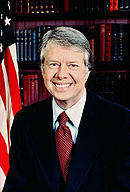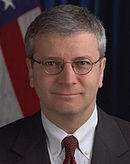- Midnight regulations
-
Midnight regulations is a term for United States federal government regulations created by executive branch agencies in the lame duck period of an outgoing President’s administration.
Contents
Process of creating new regulations
The United States Congress passes laws that sometimes outline only broad policy mandates. Rulemaking by the specialist agencies in the executive branch adds necessary detail to these laws. Rulemaking also provides an administration with an opportunity to exert political influence over government without having to go through Congress to change the law.
U.S. federal law mandates a 60-day waiting period before any major regulatory changes become law. Thus, some Presidents try to publish new major regulations on November 21, 60 days before the new President’s inauguration on January 20. “Minor” regulations, or those that have less than US$100 million in effect on the economy or do not have major social policy significance,[1] have a similar 30-day waiting period. Tom Firey, of the Cato Institute's Regulation magazine, argues that most midnight regulations are in fact primarily political symbolism rather than major regulatory change.[2] Regulations that have not yet become law can be placed on hold by the incoming President.[3]
Regulations that take effect before a new President takes office can still be reversed by the same executive agencies, but this requires a considerable rule-making process. In addition, reversing recently enacted regulations may distract an incoming administration from its own regulatory agenda.[1] Alternatively, because regulations are executive branch agencies’ interpretations of statutes passed by Congress, Congress can effectively overturn the regulations by passing more explicit statutory mandates. But in each case the period in which the disfavored regulations are law may permit undesired results to take place. For example, a heavily-polluting power plant could be built in the period that a federal regulation is law.[4] A third option is for Congress to overturn the regulation under the Congressional Review Act of 1996, requiring congressional approval for any similar rule issued in the future. Of the 50,000 regulations enacted since the Act was passed, only one has been so overturned.[5]
History
 Jimmy Carter was the first President to make extensive use of midnight regulations.
Jimmy Carter was the first President to make extensive use of midnight regulations.
The term "midnight regulation" entered the lexicon in 1980–81, during the final months of Jimmy Carter’s single term as President.[6] Carter’s administration set a new record for midnight regulations[6] by publishing more than 10,000 pages of new rules between Election Day and Ronald Reagan's Inauguration Day.[4] The term is an allusion to the “midnight judges” appointed by John Adams in the final months of his presidency.[4]
Due to the phenomenon of midnight regulations, since 1948, during the period between a presidential election and the inauguration of a president of a different party, the Federal Register has averaged 17 percent more pages than during the same period in non-election years.[6][7] Presidents George H. W. Bush, Bill Clinton, and George W. Bush have made the most extensive use of midnight regulations, mainly because the incoming President in all three cases was of the opposing party.[4]
Clinton
The Clinton Administration enacted a flurry of rules limiting logging and lead paint, raising appliance energy efficiency, and tightening privacy of medical records.[8] One of Clinton's midnight regulations imposed a more stringent drinking water standard for arsenic after years of EPA study. Although Bush suspended the new regulation upon taking office, EPA head Christine Todd Whitman eventually approved it.[4] When President George W. Bush took office in 2001, his administration acted to block the implementation of 90 final rules that were issued in the final months of the Clinton administration but that had not yet gone into effect.[9]
George W. Bush
 Bush Chief of Staff Joshua Bolten wrote a memo encouraging Administration agencies to pass rules in time for them to become law before the end of Bush's second term.
Bush Chief of Staff Joshua Bolten wrote a memo encouraging Administration agencies to pass rules in time for them to become law before the end of Bush's second term.
The Bush administration also approved thousands of pages of dozens of new agency rules,[10] setting a new record.[11] Many of these regulations were promulgated in the hope of ensuring enactment before Barack Obama took office and could prevent the rules from becoming law. Bush Chief of Staff Joshua Bolten encouraged timely passage of the rules in a May 2008 memo to agencies suggesting that final versions be submitted by November 1.[9] Finalized and proposed rules included:[1]
- A finalized rule effectively deregulates industrial farms
- An adopted rule opens up public land to drilling preliminary to the development of oil shale extraction
- A proposed rule provides for a conscience clause for workers at hospitals receiving federal money (particularly state hospitals), allowing them to refuse to perform abortions or dispense contraceptives
Several other rules were already adopted in late 2008, including one increasing truck drivers' maximum hours of service to eleven and another restricting employee time off under the Family and Medical Leave Act.[12] The rules attracted considerable criticism.[13]
Hours after Obama took office, his administration ordered all executive branch agencies to halt enactment of any rules proposed during the Bush Administration until the incoming administration could review them.[14] According to the environmentalist magazine Grist, these efforts were effective in only a few cases; for other environmental rules the Obama administration tried to reverse some rules through Congress and some through the same slow administrative rulemaking process while interest groups challenged other environmental regulations in the courts.[15]
A subcommittee on administrative law in the Democratic House of Representatives held a hearing on midnight regulations the month after Obama's inauguration.[16]
References
- ^ a b c Chideya, Farai (November 20, 2008). "Dems Scrutinize Bush's Midnight Regulations". News & Notes, NPR. http://www.npr.org/templates/story/story.php?storyId=97260899. Retrieved December 1, 2008.
- ^ "Congress and Midnight Regulations" featuring Thomas A. Firey. Cato Institute podcast. January 9, 2009. 7:51 minutes in. Retrieved on November 20, 2010.
- ^ Overby, Peter (November 21, 2008). "Bush Hits Deadline For 'Midnight Regulations'". Morning Edition, NPR. http://www.npr.org/templates/story/story.php?storyId=97291312. Retrieved November 29, 2008.
- ^ a b c d e Kolbert, Elizabeth (November 24, 2008). "Comment: Midnight Hour". The New Yorker. http://www.newyorker.com/talk/comment/2008/11/24/081124taco_talk_kolbert. Retrieved November 29, 2009.
- ^ Sapien, Joaquin (November 19, 2008). "Will Bush’s midnight rules be reversible?". The Politico. http://www.politico.com/news/stories/1108/15758.html. Retrieved December 1, 2008.
- ^ a b c Antony Davies and Veronique de Rugy (March 2008), Midnight Regulations: An Update, Mercatus Center, George Washington University, Working Paper No. 08-06
- ^ Cindy Skrzycki, Bush Wants Sun to Set on Midnight Regulations, The Washington Post, Tuesday, June 3, 2008; Page D03
- ^ Broder, John (September 9, 2007). "A Legacy Bush Can Control". The New York Times. http://www.nytimes.com/2007/09/09/weekinreview/09broder.html. Retrieved November 29, 2008.
- ^ a b Skrzycki, Cindy (November 11, 2008). "Democrats Eye Bush Midnight Regulations". Washington Post. http://www.washingtonpost.com/wp-dyn/content/article/2008/11/10/AR2008111002902.html. Retrieved November 29, 2008.
- ^ Leahy, Stephen (December 1, 2008). "ENVIRONMENT-US: Bush Quietly Passes Dozens of New Rules". IPS. http://ipsnews.net/news.asp?idnews=44924. Retrieved December 3, 2008.
- ^ Harris, Paul (December 14, 2008). "Bush sneaks through host of laws to undermine Obama". The Guardian. http://www.guardian.co.uk/world/2008/dec/14/george-bush-midnight-regulations. Retrieved November 20, 2010.
- ^ Power, Stephen; Elizabeth Williamson and Christopher Conkey (November 20, 2008). "White House Pushes Through a Flurry of Rule Changes Sought by Business". The Wall Street Journal. http://online.wsj.com/article/SB122714583954143319.html. Retrieved December 3, 2008.
- ^ Schwartz, Emma (October 30, 2008). "The Bush Administration's Midnight Regulations". ABC News. http://abcnews.go.com/Blotter/Story?id=6146929&page=1. Retrieved November 29, 2008.
- ^ Zakaria, Tabassum (Jan 20, 2009). "WHouse stops pending Bush regulations for review". Reuters. http://www.reuters.com/article/idUSTRE50J88L20090121. Retrieved November 20, 2010.
- ^ Livermore, Michael (February 4, 2010). "Midnight regulations: After midnight, we're going to let it all hang out.". Grist. http://www.grist.org/article/2010-02-04-midnight-regulations. Retrieved November 20, 2010.
- ^ "Hearing on: Midnight Rulemaking: Shedding Some Light". United States House Judiciary Subcommittee on Commercial and Administrative Law. February 4, 2009. http://judiciary.house.gov/hearings/hear_090204.html. Retrieved November 20, 2010.
Categories:
Wikimedia Foundation. 2010.
